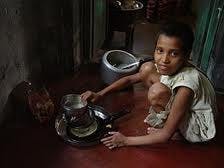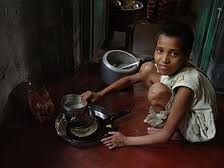Behind closed doors - Violence against domestic workers of India
Dec 19, 2017
Story


Violence against women, is common in every sphere of work today but women employed in our domestic sectors, remain the most exploited and helpless of them.This large population, mainly of women and children,faces more than just abuse and prejudice at the hands of their employers.
Domestic workers (or "servants" as most of them are addressed in India),have slowly become a very important part of our lives, especially to those living in urban cities and leading a busy life.They sweep,they wash,they cook and even take care of our children and elderly.
Yet,these millions of women, men and children are denied their due credit and continue to remain invisible and silent.
Sangeeta, a 17-year-old domestic worker from Assam had come to Delhi to work as a domestic help in one of the posh localities. Within a short period of time, her daily torture and beatings started at the hands of her employer. Along with the emotional humiliation, she also faced extreme physical pain. It was only when the neighbors heard her pleas, did the police come. The police along with a group of activists working for the cause of domestic helps, rescued Sangeeta from that house and informed her parents. Once her parents reached, the employer managed to convince them and settled for an out of court decision where he paid them a measly sum as compensation for the beatings suffered by their daughter ( her body had bite marks all over ).Later the girl and her parents were sent back to Assam and nothing happened to the employer.
Similarly in the state of West Bengal,Hasina,a minor,was victimized repeatedly at her employer's house,with pins poked at her body including her private parts.Police's inaction failed to register a complaint in this case and the minor was left with some permanent emotional and physical damage.
Such ghastly horror stories are not isolated ones and there are many others whose stories never come out in the open.
With an estimated official figure of 90 million domestic workers in India ( with more than 20% being children below the age of 14),it is often the women and children who suffer the most. Unable to bear the harsh economic conditions, parents from tribal and poor communities,send their children to work in the cities, in the hope of earning extra income and leading a secured life.In turn, they get exploited, abused and tortured simultaneously.The 'placement agencies' who lure these people into the jobs,are often not registered with the government,and work hand in glove to exploit the young girls and children who come to them.
It is estimated that from the year 2010 to 2011, more than 8000 girls have gone missing from West Bengal alone, falling prey to false promises of secured jobs in the city. The parents remain helpless and the police refuse to cooperate.
But the govt.authorities finally seem to have taken cognizance of the matter and started putting together initiatives but a lot needs to be achieved.The grave situation seems to be changing, but at a very slow pace.
In 2011, after intense campaigning by various organizations who represent the domestic workers, the ILO (International Labor Organization) passed the Domestic Workers Convention (No 189). Yet almost two years later,India has done little to ratify this convention.
The ILO report "Domestic workers across the world : Global and regional statistics and the extent of legal protection, points out several loop holes that exists pertaining to the labor rights of domestic workers. For instance, more than half the domestic workers around the world, have no fixed minimum wage. The number of minimum working hours, weekly offs and maternity leaves are not clearly defined, hence are not acknowledged by the employers.
Few states of India, though have taken the right step toward this. Kerala, Andhra Pradesh,Karnataka and Bihar have recently recognized and included the domestic workers in the legal provisions for minimum wage. Entitlement to a weekly off and ban on children under the age of 14 from work,was also brought under the ambit of this legislation for domestic workers.
Also we have the Protection of Women Against Sexual Harassment at Workplace, 2010 bill, which approved the inclusion of domestic workers within the bill's purview. Judging by India's huge 4 million women domestic workers, the bill comes as a major victory in helping to protect and safeguard the rights of women workers as domestic helps.
Though the law and the steps taken are always welcomed but what really needs to change is our mindset and attitude toward these people.We meet them everyday, yet choose to ignore their existence. For us they remain as someone who works for us and is below us. We are their masters.This kind of attitude will not help in bringing any law into fruition.
The domestic workers need to understand that they are our "workers" and not slaves. They have the right and freedom to live with dignity as much as we do.
We need to start looking at them as individuals first,who deserve equal recognition for their work just as much as they deserve respect and dignity for who they are.




